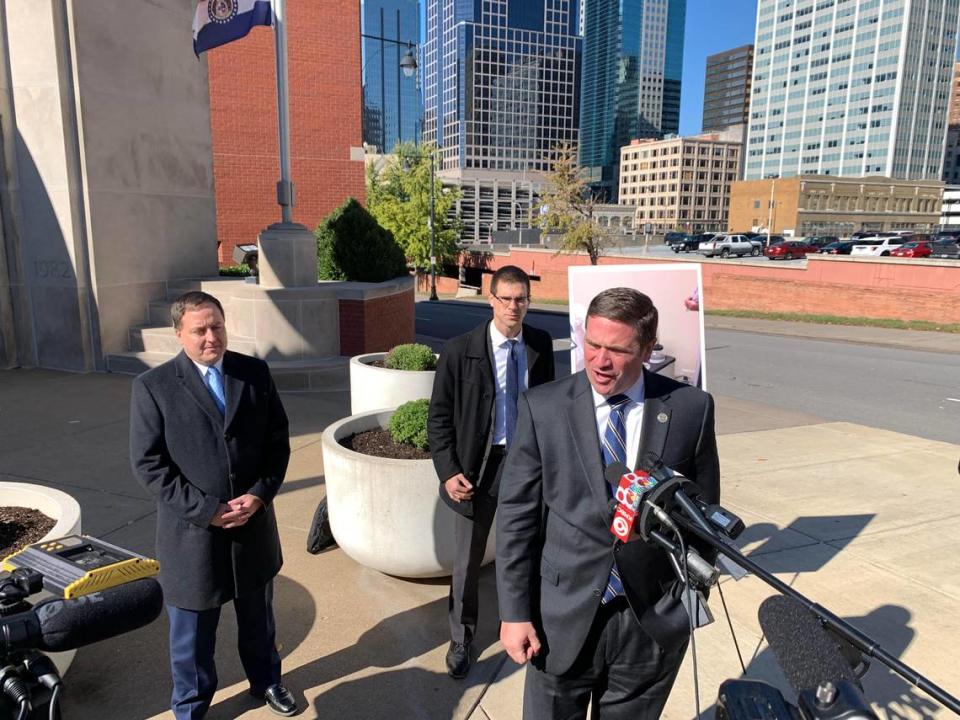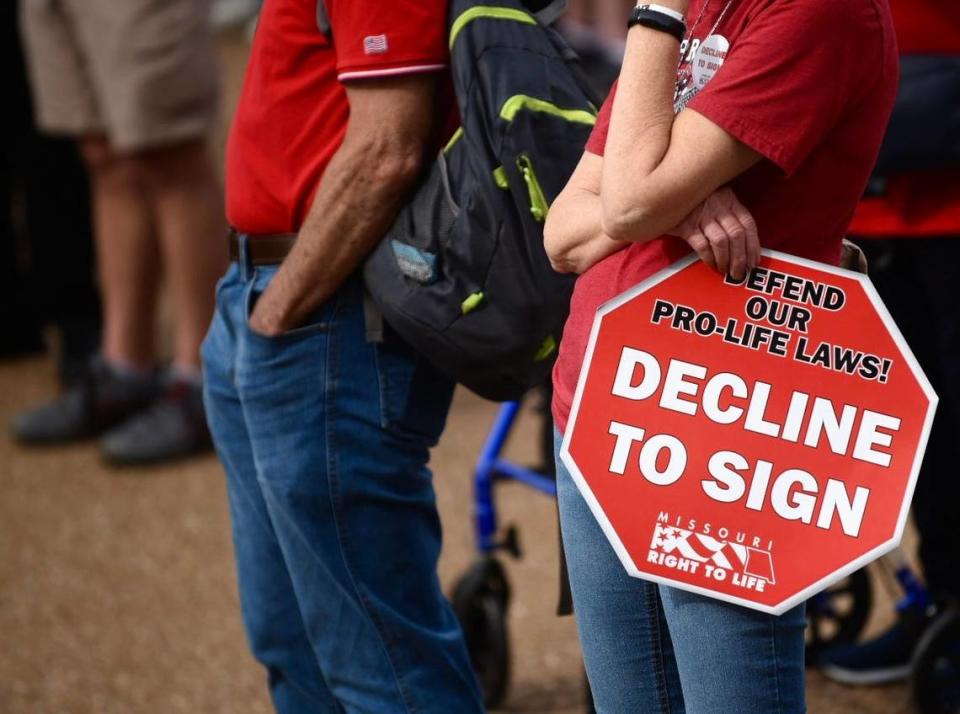Delay, inflate, inflame: Has Missouri GOP made new playbook to defeat abortion rights?
- Oops!Something went wrong.Please try again later.
Reality Check is a Star series holding those with power to account and shining a light on their decisions. Have a suggestion for a future story? Email our journalists at RealityCheck@kcstar.com.
As Missouri abortion rights groups began a campaign to overturn the state’s ban on the procedure last year, top Republican officials moved to render the effort politically toxic.
Secretary of State Jay Ashcroft proposed incendiary language for the ballot question that would have asked voters to “allow for dangerous, unregulated, and unrestricted abortions.”
Attorney General Andrew Bailey and two Republican state lawmakers pushed for the measure to include a potential loss of $12.5 billion to the state — a sensationalized estimate of financial damage recommended by anti-abortion groups.
The courts struck down both efforts. But the series of legal battles that ensued kept the abortion rights effort tied up in court for months and delayed supporters from collecting signatures. The campaign was forced to scramble and gathered enough signatures in roughly three months.
While Ashcroft and Bailey were unsuccessful, their actions shined a light on the typically ministerial role statewide officeholders play in signing off on ballot measures. The use of their offices to resist the proposals could create a new playbook for politicians in other Republican-led states after the U.S. Supreme Court struck down Roe v. Wade in 2022.
“It’s a way of trying to impede the prospects for policy proposals or ballot measures that you may not like,” said Peverill Squire, a political scientist at the University of Missouri-Columbia. “Since these ballot measures run on a clock … they can then try to slow things down.”
The failed effort to undermine the measure, or block it from the ballot, came as abortion rights remain popular nationwide, even in red states such as Missouri. Since Roe v. Wade was overturned, every ballot measure seeking to expand abortion access, from Michigan to Ohio, has succeeded.
Missouri has grown staunchly conservative over the last decade. Republicans control every statewide office and hold supermajorities in both chambers of the General Assembly. But at the same time, a plurality of 44% of likely voters support overturning the abortion ban, according to a February poll from Saint Louis University and YouGov.
“The last-ditch efforts to confuse voters, to block what is the natural democratic process is all about knowing that you’re going to lose,” said Emily Wales, the president and CEO of the advocacy arm of Planned Parenthood Great Plains. “When you are winning a campaign, you don’t have to try all sorts of tricks to get people to vote for you.”
Spokespeople for Ashcroft and Bailey did not respond to questions for this story.
Delaying the proposal
Shortly after a series of abortion rights petitions were filed last year, Bailey rejected a fiscal note prepared by Republican Auditor Scott Fitzpatrick that estimated the measures would have no cost to the state. Bailey argued that the proposals would cost the state billions, a figure that Fitzpatrick flatly said was inaccurate.
When asked about the outsized financial estimate at the time, Bailey’s spokesperson Madeline Sieren vowed to “use every tool at our disposal to defend the sanctity of life.”
Ashcroft, who is running for governor, also crafted summaries for the petitions that described abortions as “dangerous.” Those summaries would have appeared on the question that voters see at the ballot box.
Those actions kicked off a series of legal battles surrounding the estimated cost and the wording of the amendment that would appear on the ballot. The Missouri Supreme Court ruled against Bailey in July 2023 and a Cole County judge tossed Ashcroft’s language in September 2023 (An appeals court later upheld that ruling).
The Missouri Supreme Court ruled that Bailey had overstepped his authority as attorney general and the appeals court wrote that Ashcroft’s summaries were “replete with politically partisan language.” The state Supreme Court in 2022 ruled against Ashcroft for similar delays in 2019.

The court rulings marked major victories for abortion rights supporters. However, the monthslong legal battles severely limited the amount of time the campaign had to collect signatures to get the measure on the ballot.
“The delay obviously had a huge impact on the campaign,” said Maggie Olivia, the senior policy manager for Abortion Action Missouri. “I don’t know that we’ll ever be able to truly measure how big that was.”
The lengthy hold up had cast doubt on the ability of supporters to craft an expensive and time-consuming campaign. But campaigners raised millions of dollars and in May dropped off more than 380,000 signatures from voters across the state — well above the roughly 171,000 required.
Missouri voters are likely to see the measure on the November ballot if it’s certified by Ashcroft’s office.
The anti-abortion playbook
Abortion rights supporters in interviews with The Star pointed to similar efforts in other GOP-led states that sought to block votes on abortion rights.
In Ohio last year, Republican lawmakers put a measure on the ballot that would have increased the approval threshold for constitutional amendments in an attempt to thwart an abortion rights campaign.
Ohio voters rejected the increased threshold during an August special election. Roughly the same percentage of voters, 57%, voted in favor of abortion rights in November.
Missouri Republicans attempted a similar tactic this year but lawmakers failed to pass the measure in the waning hours of the legislative session.

In 2022, just as voters were preparing to vote on an amendment in neighboring Kansas that would have allowed lawmakers to ban abortion, misleading text messages about the measure appeared on a number of phones. The texts urged “yes” votes to protect choice and didn’t say who had sent them.
In South Dakota, another state attempting to overturn an abortion ban, anti-abortion advocates attempted to prevent Dakotans for Health, the group leading the state’s ballot measure, from gathering enough signatures to appear on the ballot.
Some of the businesses that allowed the group to collect signatures in front of their store received hate mail. Protesters followed signature gatherers, county administrators attempted to limit where the group could collect signatures and the Legislature passed a law to allow people to withdraw their signature from a petition.
“Imagine the hardest environment to qualify an abortion rights constitutional amendment, and that’s what we went through,” said Adam Weiland, a spokesman for Dakotans for Health.
Voters in other states that are poised to vote on abortion rights in the future should be prepared for “every one of these tactics,” said Wales with Planned Parenthood.
“I think they want to create a new playbook,” she said of anti-abortion Republicans. “Based on the lack of success they’ve had, I’m not sure I’d call it a good playbook.”
She compared the efforts to regulations on abortion in GOP-led states, which are often called Targeted Restrictions on Abortion Providers or TRAP laws. Many of those laws mirror regulations in other states and are often contradictory, she said.
“You take the worst ideas to make it difficult to change the constitution or make it harder to be part of the democratic process and you just throw them all against the wall and layer on top,” she said.

Sam Lee, a longtime anti-abortion lobbyist in Jefferson City, said that efforts to block abortion rights proposals from the ballot represent a relatively new tactic since the Ohio vote.
“I think there’s a growing awareness within the pro-life movement that this has to be fought from step one, every step of the way,” he said.
Lee added that if Ashcroft certifies the proposal for the ballot, anti-abortion groups were prepared to file a lawsuit to block it. Anti-abortion advocates are also ready to step in to fight a potential lawsuit from abortion rights groups if Ashcroft’s office blocks the measure from the ballot.
“I’m not saying that we will or what it would be in, but we’re prepared to do that,” he said.
Jean Evans, a former executive director of the Missouri Republican Party, said in an interview that the actions from Ashcroft and Bailey were nothing new, calling it “playing politics.” Voters in both parties expect their elected officials to use those tactics to push for policies that they agree with, she said.
“Whether they’re blue or red, you know, Republican or Democrat, they expect their elected officials to do anything within their power to support the values that they espoused on the campaign trail,” she said. “It’s expected on both sides of the aisle.”
Squire, the political science professor, said that Republican officials are aware of what their counterparts are doing in other states and use those efforts as a guide. However, he said politicians need to be aware of what is allowed under state law.
Some politicians may try to emulate what Ashcroft and Bailey did, he said. It’s more likely that Republicans in other states will try to stymie abortion rights votes through competing ballot measures.
There are limits, he said, to putting up procedural roadblocks on ballot measures and Missouri courts have generally not been supportive of those efforts.
“Each elected official around the country has to take into consideration the context in which he or she is operating and the political environment,” he said. “Again, you know, they’re all aware of what each other is up to.”

The efforts by Missouri officials to try to block the measure from the ballot has abortion rights supporters bracing for new tactics in the future. That could include efforts to weaken abortion access through court battles or attempts to enact further restrictions even if voters approve the amendment in November.
“We have no doubt that the same anti-abortion politicians are going to have some more tricks up their sleeves,” said Olivia with Abortion Action Missouri.
But those efforts may have backfired, some abortion rights supporters argue. Wales said voters were “extremely frustrated” by officials who sought to block the measure from the ballot.
“They saw Republican officials fighting each other about how much interference there should be in the state process,” she said. “To some extent, we got to capitalize on the frustration and disappointment, and people channeled it into collecting signatures once we were able to do that.”

